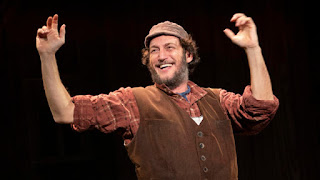Theater Review: A Crisp Fiddler in Denver
Fiddler on the Roof
Composed by Jerry Bock
Lyrics by Sheldon Harnick
Book by Joseph Stein
Directed by Bartlett Sher
Starring Yehezkel Lazarov
Denver Center for the Performing Arts
June 14, 2019
Fiddler on the Roof is one of those beloved musicals
that often seems beyond criticism, enshrined in the heart of many a junior actor
and musician from their high school days. While there was a long history in New
York of Yiddish Theater (this was famed conductor Michael Tilson Thomas’ family
background), this had vanished by the 1930s. That is one reason why the
premiere of Fiddler in 1964 was such a big deal. For the Manhattan Jewish
theater audience, it was a nostalgic return not just to their family origins in
Russia of the late 1800s, but was a revival of Jewish theater itself. Of course
no play is really beyond critique or revision. The current US touring
production of Fiddler ran on Broadway from 2015-2016 and has been popular on
tour ever since. I caught up to it in Denver.
Director Bartlett Sher does clean, thoughtful productions
that do not distract from the play, and usually amplifies their strengths. I
enjoyed his My Fair Lady recently; it was notable not for any gimmicks, but for
how deftly he handled the awkward power dynamic between Liza and Henry, making
Liza a much stronger (and more modern) woman. Fiddler tells the story of
how a hyper-traditional Russian community of poor Jews survives on Tradition,
then is dispersed during the tsarist oppression of the late 1800’s. The musical
really has no such awkward features to update. The dominant men in the community
are tweaked and subtly mocked by their often-stronger wives, but all the family
members at least try to stay within their traditional family roles, also
honoring the village Rabbi and the Yenta, or matchmaker. Its mix of valuing
tradition, sardonic humor, pragmatism, and honoring knowledge all amply reflect
historical Jewish culture. The play creates an appealing mix of nostalgia and
the need for change that is at the heart of the show, and is a theme of
immigrant culture. Of course, seeing 1890s Jews dispersed from their village to
America and elsewhere in Europe—including Poland—has great resonance given the
Holocaust and that came fifty years later. The audience’s knowledge of that
gives them perspective unshared (but somehow feared) by the villagers. This
also adds drama to the show.
As in My Fair Lady, Sher made the women a bit
stronger and more interesting than I remember from the movie, not by adding
lines but by coaching their acting in that direction. In addition, his
selection of an actor for the lead alpha male created a Tevye that was both
younger and a bit more hapless than predecessors like Zero Mostel. The
performance of 45 year old Israeli actor/director Yehezkel Lazarov was a
constant, animated delight, mixing generosity, love, frustration, kvetching,
and anger in equal measures.
As his daughters violate tradition and their father’s
wishes one by one, marrying a poor local, an intellectual Jewish outsider, then
finally a non-Jew (horrors!), Tevye deftly transitioned each time from abject
refusal to acquiescence, as long as his daughters really were in love. Perhaps the
unambiguous warmth of Mr. Lazarov’s performance removed a little tension from
the plot—I was never really convinced that he would ever say no to his daughters’
marriage requests--but that was a small price to pay for such a joyous
portrayal. Lazarov is younger than Mr. Mostel was in his debut in the role, and
lighter on his feet to boot. This made for a youthful Tevye that was a
convincing father for teenage girls. “If
I were a Rich Man” came across as witty, funny and ironic, rather than as some
sort of iconic aria. Everyone on stage appeared to be having a lot of fun,
rather than honoring an iconic play. The rest of the cast was of high level,
and handled their famed featured songs (e.g. Matchmaker, Miracle of Miracles)
with clear voices and excellent diction. Diction seems to be another Sher
characteristic--there was none of the straining to hear the words as often
occurs on Broadway.
As fits a touring production that must adapt to different
theaters, the sets were basic, functional, sometimes spare (see the wedding scene above) and effective. They were mostly browns
and greys (as were those villages), and there was no technical whiz-bang
effects. Things just stayed focused on the actors and the play. The Jewish and
Russian dance scenes were good if not spectacular. The smallish (8 member)
orchestra lacked the orchestral feel of the original production, but that is
pretty standard these days. I often feel it is a treat to have even one real
string player, as opposed to just synthesized effects. While Fiddler on the
Roof does not have explicit political points to make like so many
productions of our era, it has great enduring value, providing fun and entertainment
despite a grim ending, as we watch the Jewish villagers march off into unknown
futures. That grim ending is just as poignant and unusual as it was in 1964.


Comments
Post a Comment